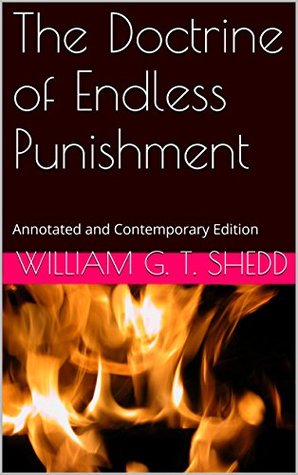Kindle Notes & Highlights
Read between
September 28 - September 29, 2025
The fall and eternal ruin of an immortal spirit is the most dreadful event conceivable.
That some of God's rational and self-determined creatures will forever be in deadly enmity to him,[8] cannot be thought of without sorrow and awe.
Speaking generally, those who believe that there is a hell, and intelligently fear it, as they are commanded to do by Christ himself, will escape it; and those who deny that there is a hell, and ridicule it, will fall into it.
Salvation supposes a prior damnation. He who denies that he deserves eternal death cannot be saved from it so long as he persists in his denial.[16]
It blots out the attribute of retributive justice; transmutes sin into misfortune, instead of guilt; turns all suffering into chastisement; converts the atoning[18] work of Christ into moral influence; and makes it a debt due to man, instead of an unmerited boon from God.
The Mediaeval church was virtually a unit in holding the doctrine of Endless Punishment. The Reformation churches, both Lutheran and Calvinistic, adopted the historical and catholic opinion.
The denial of endless punishment is usually associated with the denial of those tenets which are logically and closely connected with it — such as original sin, vicarious atonement, and regeneration.
“Walk in the ways of your heart, and in the sight of your eyes; but know that for all these things God will bring you into judgment.” (Ecclesiastes 11:9)
He needs as much grace in order to die tranquilly,
Adam could not have believed the protevangelism, knowing that death was to be the extinction of his being.
“Blessed are the dead which die in the Lord.” (Revelation 14:13)
“Father, I will that they also whom you have given me be with me where I am, that they may see my glory.” (John 17:24)
The exercise of mercy is optional with God.
It is not the doctrine of the Church, that the entire mass of pagans, without exception, have gone down to endless impenitence and death.
That some unevangelized men are saved, in the present life, by an extraordinary exercise of redeeming grace in Christ, has been the hope and belief of Christendom.
The Westminster Confession (X.3), after saying that “elect infants dying in infancy are regenerated and saved by Christ through the Spirit, who works when and where and how he pleases,”
Sorrow for sin produces morality; but morality does not produce sorrow for sin.
that there is a just God; that man has free will; and that sin is voluntary action.
The real question, therefore, is, whether God ever punishes. That he chastises, is not disputed. But does he ever inflict a suffering that is not intended to reform the transgressor, and does not reform him, but is intended simply and only to vindicate law, and satisfy justice,
The endlessness of future punishment, then, is implied in the endlessness of guilt and condemnation.
Here, in this life, all men may hope for forgiveness. “Turn, you prisoners of hope.” (Zechariah 9:2)
“An idol is nothing in the world.” (1 Corinthians 8:4) But men have “the fearful looking-for of judgment” from the lips of God, ever and always.
If the Biblical hell were as much a nonentity as the heathen Atlantis, no one would waste his time in endeavoring to prove its non-existence.
There are probably no men in paganism who sin so willfully and devilishly as some men in Christendom. Profanity, or the blaspheming of God, is a Christian and not a Heathen characteristic.[179]
Sin is the suicidal action of the human will.
A man is not forced to kill himself, but if he does, he cannot bring himself to life again.
And a man is not forced to sin, but if he does, he cannot of himself get back where he was before sinning. He cannot get back to innocence, n...
This highlight has been truncated due to consecutive passage length restrictions.
This explains why there is no repentance in hell, and no meek submission to the Supreme Judge.
The lost spirits are not forced into a sphere that is unsuited to them.
The meekness, lowliness, sweet submission to God, and love of him, that characterize heaven, are more hateful to Lucifer and his angels, than even the sufferings of hell. The wicked would be no happier in heaven than in hell.
that some “have done violence to their own lives, and so fled to hell as a sanctuary, and chose damnation as a release.”
The thoroughly vicious and ungodly man prefers the license and freedom to sin which he finds in the haunts of vice, to the restra...
This highlight has been truncated due to consecutive passage length restrictions.
He would rather be in the gambling-house and brothel than in the Christian home. “Those that, notwithstanding all gracious means, live continually in rebellion against God; those that impenitently die in their sins; those that desire to live here forever, that they might enjoy their sweet sins; those that are so hardened and naturalized in their vices, that if they were revived and brought again into this world of temptations, would certainly return to the pleasures of sin; is it not right that their incorrigible obstinacy should be punished forever?” (Bates)[181]
It is pure wickedness without regret or sorrow, and with a delight in evil for evil's sake.


